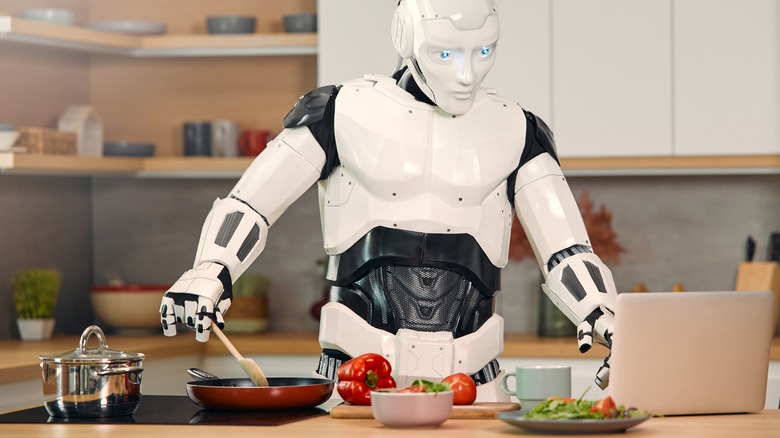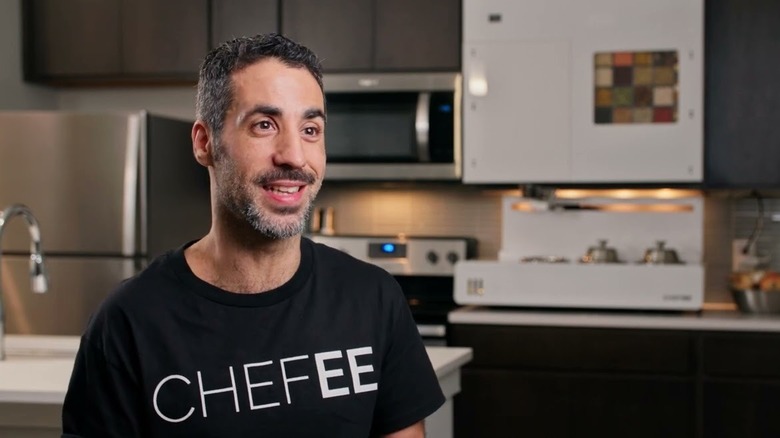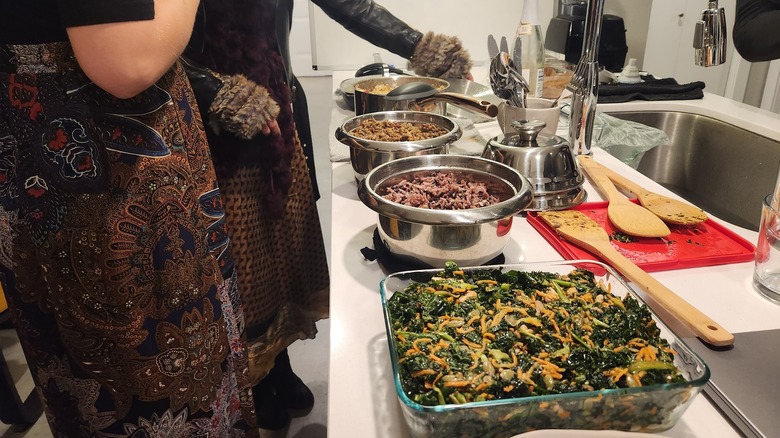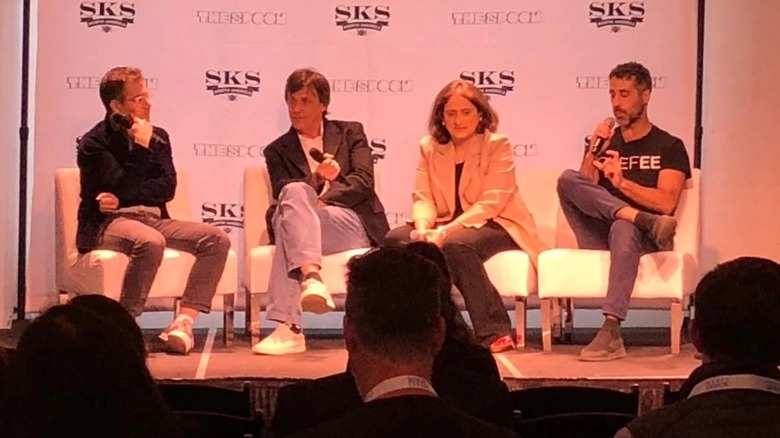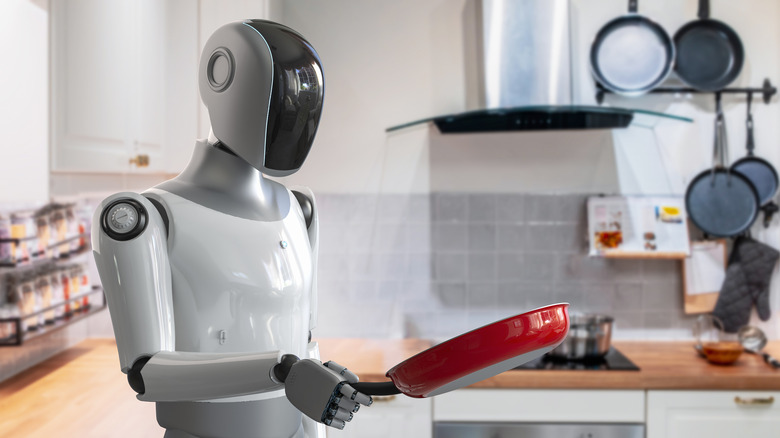Whatever Happened To Chefee Robotics From Shark Tank?
Remember when we first saw robots infiltrating restaurants? Now, they're infiltrating kitchens in the best possible way. Chefee Robotics, pitched in Season 15 of "Shark Tank," promised a transformative leap in home cooking. The product, branded as Chefee, is an embedded robotic kitchen system intended to plan meals, order groceries, dispense ingredients, cook dishes, and track nutrition — all controlled via an app. Inventor Assaf Pashut, a former San Francisco restaurateur turned robotics entrepreneur, developed Chefee after years of working in kitchens and refining a robotic arm prototype. The concept garnered attention for its ambition as a self‑cooking kitchen housed within a standard cabinet, designed to revolutionize how busy families eat healthy meals.
When Chefee appeared on the show in early 2024, the product sparked curiosity among viewers, though the company was still in early development stages — operating with working prototypes and awaiting delivery plans. The episode generated excitement about the potential future of kitchen automation, but there were still a lot of questions out there about scalability, pricing, and market demand (it seems cool, but are peoplereally going to buy it?).
Now, more than a year after its TV debut, readers want to know if Chefee has moved from novelty to reality. On air, the entrepreneurs were able to secure a deal with Kevin O'Leary, who was willing to support the vision. But as we all know, there are times when those deals fall through after the fact. In this case, it seems that Chefee is still on the come up, which is a good sign for supporters of this innovative brand.
What happened to Chefee Robotics on Shark Tank?
During his appearance, Assaf Pashut delivered a compelling demonstration where Chefee prepared three dishes — Spanish paella, spicy ratatouille, and tofu tikka masala — in front of the Sharks. The system consists of two modules: an upper portion fitting into a cabinet for ingredient storage (both refrigerated and dry), and a lower cooking module. The upper dispensed and weighed ingredients into an induction cooker below, enabling voice‑ or app‑driven customization, portion control, and scheduling. He emphasized integration with Instacart or Amazon Fresh for seamless grocery delivery and weekly restocking. Pricing ranges from a base model at $9,500 (excluding refrigeration) to premium versions costing $40,000 to $50,000, with greater ingredient capacity and functionality.
Assaf also disclosed his company was pre‑revenue but already had a $500,000 letter of intent from a Palm Springs high‑end kitchen remodeling firm. To date he'd raised $450,000 from other investors and committed $90,000 of his own capital, with unit costs estimated at $1,500 in materials and $1,000 in labor.
The Sharks were intrigued by the concept, but naturally they had concerns. Barbara Corcoran, in typical Barbara fashion, backed out, saying execution trust was lacking. Robert Herjavec pointed to cheaper meal‑prep alternatives, and Lori Greiner doubted market adaptability was there. Mark Cuban dismissed the venture as an integration business rather than true robotics, questioning the brand's technical depth. Kevin O'Leary remained interested, citing a luxury market and licensing potential with brands like Sub‑Zero/Wolf. Assaf sought $500,000 for a 4% equity stake, but when this didn't pan out, he accepted Kevin's final offer of $500,000 for 15% equity.
Chefee Robotics after Shark Tank
After the episode aired, Pashut followed through on a high‑end market strategy aligned with Kevin's vision. Interviews and coverage from 2024 indicate Chefee remained pre‑revenue but was actively fulfilling reservations. Kevin O'Leary's involvement remains unclear since he isn't mentioned on the company website, but that doesn't necessarily mean he's absent behind closed doors.
In a May 2024 interview with "The Spoon," Pashut explained that Kevin encouraged them to launch in exclusive luxury homes first to avoid scaling too quickly and also to manage potential recalls or maintenance challenges. That strategy was informed by caution, with the idea being it would be better to perfect early installations rather than rush mass distribution. Interest from major brands like Samsung and Sony along with inquiries from international markets (India, Australia, United Kingdom) had reportedly increased. By late July 2024 the company had raised approximately $750,000 in angel funding.
As of early 2025, Chefee's website continues to accept pre-orders, offering reservation perks such as $1,000 in groceries and early-bird pricing. The reservation fee stands at $250 and models now include a countertop version ($39,995), standalone ($49,995), and built‑in unit ($59,995); each with optional monthly plans ($599–$799) and installation included.
Is Chefee Robotics still in business?
Chefee Robotics is still in business, but it remains firmly pre‑revenue with no confirmed deliveries to private homes as of mid‑2025. It's one of those products where you really have to believe in the process because while it continues to offer reservations and quotes through its website, actual units do not appear to have shipped out yet. The absence of Kevin O'Leary's name on the corporate site raises questions about whether the original Shark deal fully closed or remains contingent on further milestones.
What has kept Chefee afloat is timely strategic alignment and prudent scaling which has been done through focusing on luxury clientele and licensing opportunities rather than mass-market rollout. Essentially, it's a niche product that only a select group of people in a particular price bracket will be able to afford — and that's fine. It's one of those situations where you have to know your audience and stay focused on who you're targeting. The pricing model — ranging up to $59,995 for built‑in systems — promotes Chefee as a premium appliance. If the company successfully partners with real estate developers, luxury apartment operators, assisted living facilities, or hospitality groups (as suggested on its website), that could deliver traction even without direct consumer sales.
Tech fair participation (like GITEX 2024 in Dubai), demo installations in select showrooms nationwide, and invitations to events such as CES 2025 and the Smart Kitchen Summit have all kept momentum going. Yet, until customer installations and reviews emerge, Chefee remains a promising concept rather than a proven commercial success.
What's next for Chefee Robotics?
Chefee Robotics is clearly positioning its product and marketing toward luxury property developers, property managers and hospitality brands; hoping to install Chefee units across residences, condos, hotels, and Airbnbs to boost tenant retention and premium branding. The website emphasizes turnkey installation, premium support, smart-home integrations, and data-driven analytics for property owners to monitor usage and resident satisfaction.
Assaf Pashut has continued to generate exposure through trade shows and public speaking with plans to launch a crowdfunding campaign on StartEngine to raise additional capital. The company also teased new product developments, including a Chefee Airfryer module and potential Chefee V2.0 with integrated chopping capabilities, based on feedback from Reddit discussions and founder comments.
Overall, Chefee seems to be thriving despite being kind of stuck in development mode and refining the product, building strategic partnerships, and securing seed and angel investments. Pashut envisions licensing deals with major appliance brands and hopes to scale through real estate partnerships. As of mid‑2025, it remains to be seen whether Chefee will evolve into the "standard kitchen appliance" that Pashut envisions.
